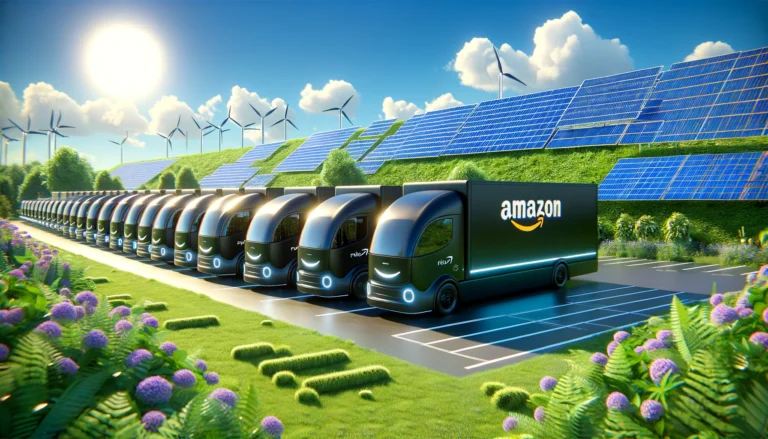Amazon‘s initiative to deploy Rivian Electric trucks at its Poway, California, facility underscored the tech giant’s commitment to environmental sustainability. This move is part of a broader trend among leading corporations, including Amazon, to intensify their efforts in reducing their carbon footprint. These companies are not only revolutionizing their operational practices but are also extending their eco-conscious mandates to their suppliers, signaling a significant shift in corporate responsibility towards environmental sustainability.
Amazon Sets New Sustainability Standards for Suppliers
Amazon announced in its latest sustainability report that starting from 2024, it will mandate its suppliers to disclose their emissions data, establish emissions reduction targets, and report on their progress. This initiative places Amazon alongside other corporate giants like Microsoft, Walmart, and Apple in the push for a more sustainable supply chain. The move reflects a growing demand from consumers, investors, regulators, and governments for greater transparency and action on environmental sustainability.
The Ripple Effect on Suppliers
The sustainability requirements set by corporations are cascading down through layers of suppliers, creating a network of businesses that are increasingly focused on reducing their environmental impact. This dynamic shift is largely driven by the realization that a significant portion of a company’s carbon footprint—often around 75% according to non-profit CDP’s analysis—comes from indirect sources such as supplier operations and product usage by customers.
The Strategic Focus on the Supply Chain
Andrew Winston, a well-respected author on sustainability in business, highlights the strategic importance of the supply chain in corporate sustainability efforts. Companies can exert more direct control and influence over their suppliers compared to other indirect emissions sources. This control allows them to enforce eco-friendly practices more effectively, setting a precedence for environmental responsibility that resonates throughout the entire supply chain.
Increasing Demands and Challenges for Suppliers
While the push for decarbonization is gaining momentum, it also presents significant challenges, especially for smaller suppliers. Many small and medium-sized enterprises (SMEs) recognize the importance of reducing emissions but often find themselves constrained by a lack of resources, skills, or financial capacity. This paradox is reflected in surveys by SME Climate Hub and Intuit QuickBooks, which reveal a high level of eco-consciousness among SMEs despite barriers to implementing sustainable practices.
The Economic Dilemma for Small Businesses
In the face of economic uncertainties, small businesses are finding it increasingly difficult to prioritize sustainability over immediate financial and operational challenges.
Future Outlook: Adaptation and Support
Despite these challenges, the transition towards sustainability is inevitable, with procurement practices playing a crucial role in motivating suppliers to adopt greener practices. As companies strive to meet their environmental targets, they are looking deeper into their supply chains to identify and address areas of high emissions. This scrutiny often leads to support for suppliers in meeting sustainability requirements, ranging from financial assistance to access to clean technology.
Amazon’s sustainability report underlines the company’s strategy to leverage its scale and innovation to assist suppliers in achieving their environmental goals. However, the company also signals that there might be consequences for suppliers who fail to align with Amazon’s decarbonization vision.
A Collaborative Path Towards Sustainability
The evolving landscape of corporate sustainability underscores the importance of collaboration between companies and their suppliers. As businesses navigate the complexities of reducing their carbon footprint, the collective effort across the supply chain will be pivotal in achieving significant environmental progress.



